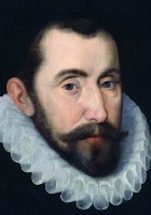 John Wilbye was an English Renaissance poet and one of the finest recorded composers of madrigal musical pieces.
John Wilbye was an English Renaissance poet and one of the finest recorded composers of madrigal musical pieces.
He was born some time in February or March, 1574 in the small Suffolk village of Brome, which is close to Diss. Being the son of a landowner and successful farmer his family circumstances were comfortable and he soon developed writing and musical skills that would be noticed by many, including Sir Thomas Kytson who was the occupant of the nearby Hengrave Hall. Sometime during 1595 Wilbye was invited to the hall to take up the position of musician in residence. This proved to be a long and fruitful liaison for the young man who was, a few years later, granted the lease to a prosperous sheep farm.
He also received favour from the Cornwallis family at Brome Hall. Elizabeth Cornwallis was married to Sir Thomas Kytson, meaning that Wilbye enjoyed the patronage of more than one well-to-do local family. The Kytson family also introduced him to London musical society and his first book of madrigals was soon published, in 1598, in London. It took another 11 years for a second book to be published though. The two books contained at least 64 original madrigals. It is believed that he composed only two other madrigals, these remaining unpublished for some reason.
Wilbye concentrated on his poetic and musical career with such intensity that it seemed that there was no time for personal relationships, or no long-lasting ones at any rate. He never married and was content to spend his time at Hengrave or at the family’s London residence. The practice of “recusancy” was de rigeur at the Suffolk residence, meaning that the family (the “recusants”) were strictly anti-Anglican faith, displaying fierce loyalty towards the Pope. Wilbye will, no doubt, have composed a great deal of religious music but none of this survived. Only his madrigals, and poetry, have found their way into Renaissance musical and literary history.
His poetic style could often be described as romantic and his work was certainly written from the heart. Despite there being no evidence of lasting female relationships in his lifetime he certainly displayed a passionate nature in love poems such as

Another poem,

seems to illustrate his frustrations of a life of unrequited love, the narrator lamenting the years passing without true fulfilment. The poem is reproduced below:

He could, though, be described as only a minor poet with his talent as one of the best of the English madrigalists being the major reason for his fame. Modern anthologies include such titles as

and his work was said to exhibit a distinctive style of “delicate writing for the voice”. He has often been compared to fellow “Italianised” poets such as Edmund Spenser and Sir Philip Sidney with a tendency to use pure literature in his madrigals. Other madrigalists of the time were not quite so precise in the text that accompanied their music.
and his work was said to exhibit a distinctive style of “delicate writing for the voice”. He has often been compared to fellow “Italianised” poets such as Edmund Spenser and Sir Philip Sidney with a tendency to use pure literature in his madrigals. Other madrigalists of the time were not quite so precise in the text that accompanied their music.
John Wilbye died in Colchester, Essex sometime during the month of September 1638. He was 64 years old.

